
Every part of Britain had a champion author, Wessex had Hardy, Yorkshire had Bronte and Dartmoor had Eden Phillpotts. He was/is a very elusive and multi-talented person who, in my opinion had the gift of portraying the landscape, people and spirit of Dartmoor better than any other writer. Apart from his works his footprint has been very feint in the annals of history which some will say is exactly how he would wish it. Today his books can fetch anything up to £800 for good condition first editions. However, the good news is that the titles below that appear as links will take you to the free downloadable pdf versions on The Internet Archive. But of the man himself his talents were far ranging, during his lifetime he was an author, poet, painter and playwright. Amongst his writings were mysteries, works of science fiction, fairy tales, essays, reminisces, magazine articles and his most famous, the Dartmoor stories.
Eden Phillpotts was born on the 4th of November 1862 at Mount Aboo, Rajputana (India), his father Captain Henry Phillpotts was in the Indian Army and was sadly killed out there in 1867. Following her husband’s death, Eden’s mother returned to England with her three sons of which Eden was the eldest. He and his three brothers attended Mannamead College in Plymouth where during his school holidays he would explore Dartmoor. This soon lead to a passion for the moor and when not out walking he would be studying every aspect of what was to become the mainstay of his life. After finishing his studies he left and went to London to work as an insurance clerk at the Sun Insurance office. It was whilst in London that he found a love of the theatre and in his leisure time began to study acting, however he soon discovered his talent for writing and soon had some works published. The first of these was a poem called ‘The Witches’ Cauldron’ which was followed by various magazine articles and reviews. It was whilst he was in London he became friendly with such noted authors as Conan Doyle, Arnold Bennett and Jerome K. Jerome. In the October of 1886 ‘The Belgravia’ carried Edens’ short story called ‘A Dartmoor Picnic’. In the January of 1887 a play co-written by Walter Helmore and Phillpotts was staged, it was a farcical comedy called ‘The Policeman’. The following year ‘The Longman’s Magazine’ published another short story called ‘The Wolves’.
In 1891 his first Dartmoor themed book was published by Trischler and Co, it was a series of short stories about a holiday taken at ‘Tavybridge’ and was called ‘Folly and Fresh Air‘. The following year saw his marriage to Miss Emily Topham who sadly passed away in 1928. During their marriage they had a son and a daughter called Adelaide who often collaborated with her father’s work.
Soon his talent became recognised both at home and abroad and was mainly due to his detective novels. In 1896 a novel called ‘Down Dartmoor Way‘ was published described as “glimpses through moorland mists.” In 1898 the publishers A. D. Innes of London published another Dartmoor novel which was called ‘Children of the Mist‘ and was to become the first of his Dartmoor Cycle of books. The story was centred around Chagford and the events of the miller and his daughter. It has been suggested that originally Eden Phillpotts only intended there to be fourteen books in his cycle but once having got the bit between his teeth he actually wrote eighteen, the titles of which are shown below along with their publication dates: Each novel was set around a different part of Dartmoor and relates the trials and tribulations of ordinary Dartmoor folk along with wonderful descriptions of the various events and their moorland settings. Many of the characters are based upon the real life people he met whilst visiting the moor along with their various trades, occupations and traditions. Some of these ‘fictional’ characters were given names which can still be found on the various gravestones in the churchyards around the moor. The other titles in the ‘Cycle’ were – Sons of the Morning, The River, The Secret Woman, The Portreeve, The Whirlwind, The Mother, The Virgin in Judgement, The Three Brothers, The Thief of Virtue, Demeter’s Daughter, The Beacon, The Forest on the Hill, Widecombe Fair, Brunel’s Tower, The Miser’s Money, Orphan Dinah, and The Children of Men.
Having returned to Devon, Phillpotts first moved to Torquay where from 1901 to 1928 he lived at Eltham, Oak Hill Road, he then moved to Broad Clyst near Exeter. It was whilst living in Torquay that Phillpotts became acquainted with Agatha Christie and was to become, in her early career, a mentor. It was also around 1922 that Phillpotts began using the pseudonym of Harrington Hext, a name he would continue with until 1925.
On the 17th of October 1929, much to the amazement of the local press, Eden had secretly married his second wife Lucy Robina Webb. Such was the secrecy of the marriage that there were no decorations or the usual confetti, no best man or bridesmaids and the bride wore simple clothes.
By 1923 the last of his Dartmoor Cycle was published but his work was by no means finished. Further one-off Dartmoor novels were published such as; ‘My Devon Year‘ (1903), ‘The Farm of the Dagger‘ (1904), ‘Knock at Adventure‘ (1905) dedicated to his friend William Crossing, ‘The American Prisoner‘ (1906), ‘The Poacher’s Wife‘ (1906), ‘Fun of the Fair‘ (1909), ‘The Judge’s Chair‘ (1914), ‘A Westcountry Pilgrimage‘ (1920) and his autobiography – ‘The Angle of 88’ (1951). He also wrote several plays and poetry books also related to Dartmoor such as the play ‘Devonshire Cream’ (1930). In the November of 1957 Eden Phillpotts reached the grand old age of 95 and in that year he was writing a play called ‘There Was an Old Man’ which the BBC were producing to air at a later date. Amongst his poetry book were ‘ As the Wind Blows’ ‘A Shadow Passes‘ which is a mixture of poems and prose some of which are very moralistic, ‘A Dish of Apples‘ a work devoted to apples and cider, and ‘Cherry Stones‘. Between 1916 and 1929 several of Phillpotts’ works were later turned into films such as The Farmers Wife, The Forest on the Hill, The American Prisoner, The Secret Woman and The Mother of Dartmoor.
Whilst living in Devon Eden Phillpotts became the president of the Dartmoor Preservation Association, this being a body that at that time was very much concerned with preserving Dartmoor’s heritage and landscape. In the April of 1921 Phillpotts was one of seven Torquay dignitaries that were given the honour of ‘The Freedom of the Borough’ by the Town Council. . Eden Phillpotts died on the 29th of December 1960 at the ripe old age of 98, and if that doesn’t say something for the healthy Dartmoor air nothing will. All in all it is estimated that Eden Phillpotts had 250 books, articles, plays etc published throughout his career.
The following extract was taken from his book, The Mother and describes the prehistoric stone circle on Langstone Moor, this is but one small gem amongst a veritable chest of treasures that lie within Philpotts’ work:
“At one moment the enduring and featureless fabric of the moor surrounds a chance spectator; in the next he stands startled before the silent company of the Lone Stones. Lifted here by the toil of a departed race, their mystery is hidden, their secret is shrouded perhaps for ever; yet those best skilled in prehistoric story judge that they stand for ceremonial, and suspect that within these circles the dead were brought for final rites of fire before they sank into their urns, to be deposited far from the homes of the living. Poignant terror of the departed belonged as a large factor to primeval superstition, and the monolith and menhir, cairn and its kist, lie on mountain tops or hollowed hills remote from the haunts of the quick. Their ossuaries were haunted, and primal man feared his ghosts, even as present men love them.
Viewed on a day of late August against the purple background of Great Mis Tor, the Long Stones glimmered under sunshine and lacked much of that mystic and foreboding air that oftentimes hung over them at hours of fleeting mist, in morning and evening twighlights, or during the darkness of night and storm. Scarcely a cloud lower than the dreaming sirri of the firmament dimmed the September blue; the air danced along the immense planes of the Moor; cattle roamed far off, yet their frequent presence within the circle was manifest, for upon more than one of the old stones might be seen flecks of red, black and dun hair from the wandering herds that here are sometimes gathered to ruminate and rub their hides against granite. The circle continued its vigil of ages, subject only to Time’s tireless hand. It had witnessed events that living man may never learn. It had perchance seen the gathering of the clans and been rialto as well as a temple…” The Mother, 1909, p.93. Considering that this was published in 1909, Phillpotts had a remarkable understanding of the archaeological thinking of the time. I love his phrase where he describes the prehistoric ritual features as being located, ‘remote from the haunts of the quick‘, again a very accurate description. But even more evocative is how he describes the flecks of cattle hair caught on the rough granite stones. This small detail can only come from someone that has actually visited a stone circle and inspected it closely, then more to the point remembered it.
Throughout his life, Eden Phillpotts always preferred to avoid the spotlight and quietly get on with his career, some describe him as a recluse and give this the reason for so little being known of his life. However, there may well have been a reason for his desire for privacy. In 1976 his daughter Adelaide disclosed in an interview with Professor Dayananda that her father had allegedly sexually abused her from the age of about six or seven right up until the time her married his second wife in 1929. This revelation, if true, certainly put the man in a different light and some will say that there are hints of this deviant behaviour in many of his works?
What nobody can deny is that he has left the Dartmoor lover a legacy of superb novels that portray Dartmoor as it was over a hundred years ago. Many of his novels are now out of print and can only be found with second-hand book dealers. I will leave the final words to the man himself:
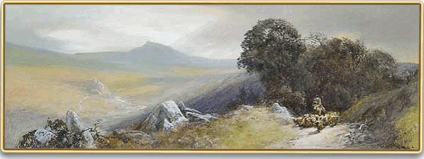
Where My Treasure Is
Eternal Mother, when my race is run,
Will that I pass beneath the risen sun,
Suffer my sight to dim upon some spot
That changes not.
Let my last pillow be the land I love
With Fair infinity of blue above;
The roaming shadow of a silver cloud
My only shroud.
A little Lark above the morning star,
Shall shrill the tidings of my end afar;
The muffled music of a lone sheep-bell
Shall be my knell.
And where stone heroes trod the moor of old;
Where ancient wolf howled round granite fold;
Hide Thou, beneath the heather’s new-born light,
My endless night.
Eden Phillpotts – 1905

Day, K. F. 1981. Eden Phillpotts on Dartmoor, Newton Abbot: David & Charles Publishing.
Palmer, J. 2000. In the Footsteps of Eden Phillpotts, The Dartmoor Magazine – No. 58, Brixham: Quay Publishing
 Legendary Dartmoor The many aspects past and present of Dartmoor
Legendary Dartmoor The many aspects past and present of Dartmoor

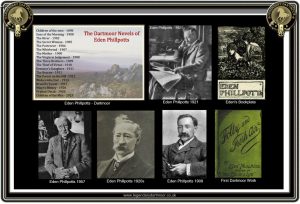
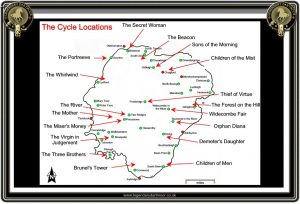
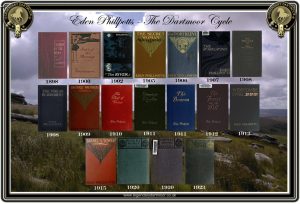
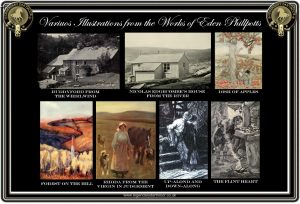
Evan Philpotts was a brillant genius. I had first heard of Evan when I saw Agatha Christie in a foreword to some
book, obviously a detective novel pay homage to him. About eleven years ago I was working for a now
deceased relation and I saw this hard cover book in his house and I asked him could I take it home to read. It
was printed in the 1930’s and lo and behold in this book of short stories was ‘Peacock House’ by Evan Philpotts ! It was a great read!
just to point out, in the introduction to your page you have attributed the BRONTES to the Lake District!!!!!! Wrong… they are from YORKSHIRE!! it might be a good idea to correct this, Thanking you in anticipation.
Done
My uncle recently offloaded a complete set of Philpotts’s works but retained one copy of a First Edition of ‘Daniel Sweetland’ from 1906. Besides being a limited, complimentary edition at that time (not sure why), it also has some letters between Philpotts and a ‘fan’ attached inside. The whole thing might be of interest to a collector? Worth anything? My uncle has asked me to find out more on his behalf. Who/where might be interested?
Not sure about the value of a first edition but there are several later editions on sale for around £10.
Thanks. Yes, I’ve looked at a few websites (e.g. Abe). It seems like Americans sell these things for a bit more (or at least pump up the ‘value’). I know from collecting books myself a little that they are interested in the Victorian English Pastoral a la Hardy, Austen, etc. Anyway, the letters are odd in that Philpotts seems to downplay his own work and is almost apologetic. I’ll persuade my uncle to keep it in case there is a huge re-interest in years to come! Thanks again.